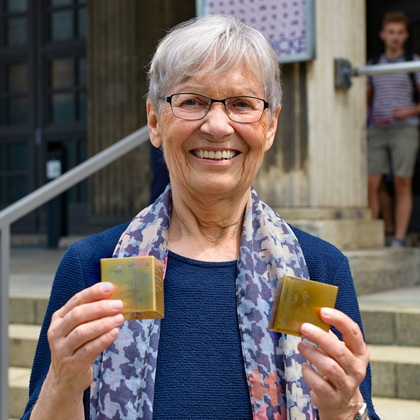Alexander Dünkelsbühler was born into a Jewish banking family in Nuremberg. In 1893 he moved to Munich, where he studied law. It was there that he met Eleonore Sporner, a young Catholic woman. In 1898 their son, Otto, was born; the couple married ten years later. Alexander Dünkelsbühler already had left the Jewish community in 1900 and had been non-denominational since then. Before the start of the First World War, he opened his own law firm in Munich. From 1914 onwards he fought for Germany in France, earning the Iron Cross as well as other medals of honor. In 1919 Alexander Dünkelsbühler and Dr. Heinrich Rheinstrom founded a law firm on Maximiliansplatz 7. Among their best-known clients was the Wacker Chemie company. Alexander Dünkelsbühler also was an executor of the will of the physicist and Nobel Prize winner Wilhelm Conrad Röntgen, who died in 1923. It was probably in 1923 that Alexander Dünkelsbühler met Elisabeth Heims, who was 20 years his junior. Though he had been living apart from his wife, Eleonore, for years by then, she did not agree to a divorce. So Alexander Dünkelsbühler and Elisabeth Heims couldn’t marry. Even so, flouting all social norms, they lived together in Arcisstraße 14 (today Katharina-von-Bora-Straße 10), which was also the address of the law office. The Nazi seizure of power changed their lives drastically. Since he had been a soldier in the First World War, Alexander Dünkelsbühler was allowed to continue working as a lawyer. But the boycott against Jews took its toll: the law firm’s income decreased markedly, as ever fewer potential clients wanted a “Jewish” lawyer. Embittered, Alexander Dünkelsbühler stopped accepting commissions from non-Jewish clients, telling them that “the dumbest Aryan can represent you better than I can.” When the “Nuremberg Race Laws” of 1935 demoted Jewish citizens to second-class status, Alexander Dünkelsbühler lost all hope: He committed suicide in Dresden on September 24, 1935. Nor did Elisabeth Heims survive the Nazi period: She was deported in 1941 and murdered. (text Ingrid Reuther, editor C. Fritsche, translation T. Axelrod)






-Heims_image.jpg/jcr:content/EZ_BILD_14523.jpg)